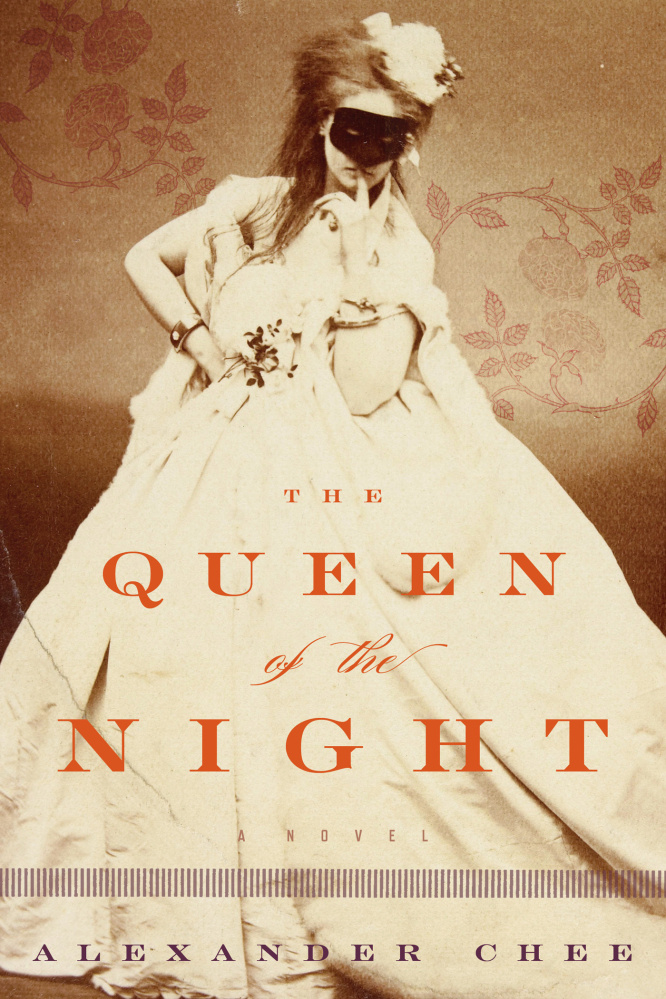Opera buffs will be intrigued by Alexander Chee’s second novel, “The Queen of the Night.” The title is a reference to the coloratura soprano in Mozart’s The Magic Flute, and by extension her devilishly difficult vocal music.
But, while the fan will not be disappointed, “The Queen of the Night” is much more than a celebration of the high-strung excesses that popularly accompany opera, as was, for instance, James McCourt’s delightful 1975 novel, “Mawrdew Czgowchwz” (pronounced “Mardu Gorgeous”). Snatches of “Faust,” “Carmen” and “Il Trovatore” are to be enjoyed throughout, but besides that, the book is as full-blooded as a blockbuster out of the late 19th century, which is, not coincidentally, when the action takes place.
The reader lives through the waning years of France’s Second Empire, the Siege of Paris in the Franco-Prussian War, the calamity of the Paris Commune and the rise of the Third Republic and the belle epoque. Chee recreates these years with considerable aplomb, but as with “opera lit,” he transcends the genre of “historical fiction.”
“The Queen of the Night” is a fabulous saga of an indomitable woman, an orphan from the pioneer farm country of Minnesota who becomes the toast of Paris as the greatest opera singer of her age.
Inevitably her hubristic rise is followed by “The Undoing,” as the book’s final section is called. As to whether this is also a redemption, Chee lets the reader decide. As he put it at the very beginning, is it the “fulfillment of a dream or a trap for the soul”?
Chee, who grew up partly in Cape Elizabeth, introduces Lilliet Berne as she dresses for a ball in Paris. The dress, from one of the city’s best dressmakers, is a disaster. “The fichu seemed to clasp me from behind as if alive – how had I not noticed?” By the end of the first page, the writer has established his authority on the customs and tastes of the times, as well as demonstrated an eye for descriptive detail ranging from a skirt’s flounces to the light that chandeliers reflect off the “ancient mirrors” of the Luxembourg Palace.
All of it flows off the page without the slightest sense of being a lecture on a particularly grandiose historical period. And at the same time, he has created a compelling narrative drive, essential for a book of nearly 600 pages.
It is revealed at the ball that someone has written a novel with various episodes that have a more than coincidental counterpart in Lilliet’s real life. Now a mysterious composer wants to turn it into an opera in which she will play the leading role.
Most of the book consists of flashbacks as Lilliet strives to find out who from her past is being indiscreet. She has four likely candidates – two men and two women – each of whom has had some kind of hold over her. In the end, the diva finds she is inextricably caught in a spider’s web of love, court intrigue and international espionage.
While there are no whips, her bondage to a German tenor is as remorseless as O’s in the erotic 1954 novel “Story of O.” Having found her in a high-class brothel, the tenor makes Lilliet into a star and, in so doing, becomes obsessed with controlling her. He will only be satisfied by their singing a particular opera together on the Paris stage. (There are shades of Gatsby’s green light, as he keeps trying to reinvent their past.)
Lilliet’s life is ever poised on the border between reality and opera, and the reader’s task akin to solving a Rubik’s cube. As the stories from the past are overlaid on each other, they leave a trail of events large and small that eventually will interlock. How Chee manages to keep them all in sight is a miracle. More than once I found myself flipping back to find a half-remembered event that was suddenly taking on new meaning.
What makes Lilliet Berne such a compelling heroine is the tension in her situation. Never able to fully free herself from the straitjacket (and danger) of her time’s social and political mores, her inner conviction that she is better than all of them is never in doubt.
While she frets and fights, the reader dines with the Verdis (on risotto cooked by Giuseppe himself), plays theatrical games with Georges Sand and lives for a while with the great soprano Pauline Viardot, in a ménage à trois with her husband and Ivan Turgenev. It’s like going to a grand opera; or reading Proust. Take your pick.
Thomas Urquhart is the author of “For the Beauty of the Earth: Birding, Opera and Other Journeys.”
Copy the Story LinkSend questions/comments to the editors.



Success. Please wait for the page to reload. If the page does not reload within 5 seconds, please refresh the page.
Enter your email and password to access comments.
Hi, to comment on stories you must . This profile is in addition to your subscription and website login.
Already have a commenting profile? .
Invalid username/password.
Please check your email to confirm and complete your registration.
Only subscribers are eligible to post comments. Please subscribe or login first for digital access. Here’s why.
Use the form below to reset your password. When you've submitted your account email, we will send an email with a reset code.